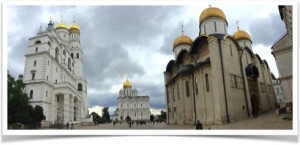In Moscow, I saw churches and domes throughout this modern cosmopolitan city of 15 million people, 600 Christian churches in all, and I visited several sanctuaries within the Kremlin Walls (Assumption Cathedral, the Church of the Deposition of the Robe, and Necropolis of the Archangel Cathedral).
When the Tsars reigned, the Churches were integral to the autocratic state, one lever of control by which to govern the masses.
Lenin fairly charged that the Church was “used for the protection of the exploitation and the stupefaction of the working class.”
When the final revolt came in 1917, the Bolsheviks took down the Tsar, but also the Tsar’s partner, the Church, in all its manifestations, outlawed its influence, even its existence.
In 1997, Russia reformed its past prohibitions, distrusting the Church less, declaring religion part of its “historical heritage” following upon Mikhail Gorbachev’s policy of glasnost (“openness”).
The most significant difference, before the Revolution, was that the Tsars made the Church a governing partner with the Nobles.
This error of making any religious institution preeminent in secular governance is not limited to the Russian experience.
As an Irish Catholic kid from the South Bronx, I saw how Catholics were treated in the U.S. when they ran for office, Governor Al Smith being the prime example, and I celebrated when JFK became President declaiming that his Roman Catholic religion would ever affect his judgment as a public servant. Discrimination against “papist” Catholics made his assurances necessary, although it’s a guarantee every candidate should make, that religion will not be allowed to interfere with governance.
When a religious sect is integral to governance, it comes at the cost of intolerance toward those who profess any “disagreeable” faith; as for the “faithful,” they are manipulated by the fear that any dissenting word or conduct may earn them temporal punishment and bar their “eternal reward.” Constantine, for example, had the skin torn off bishops who refused to believe the communion host became flesh. Continue reading

